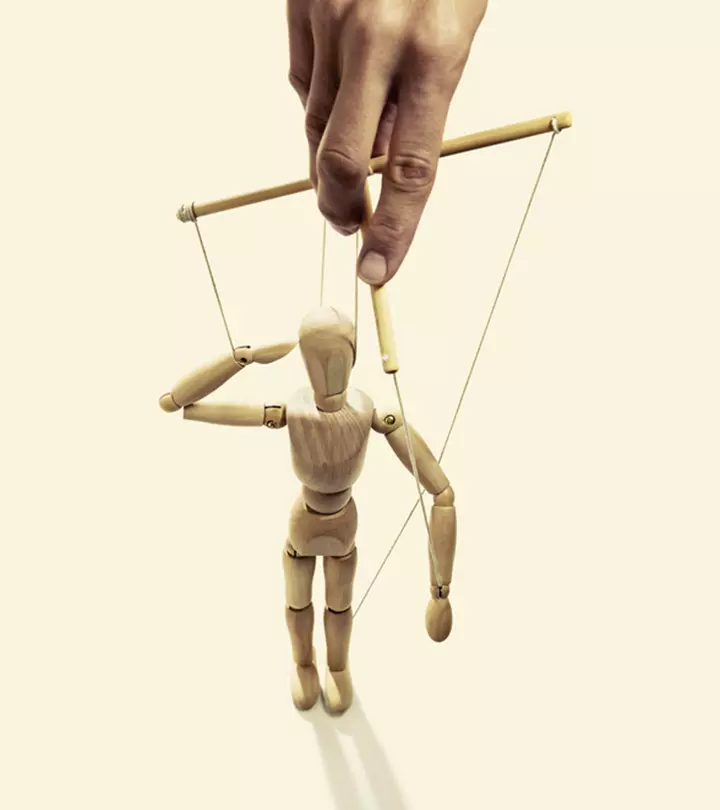11 Signs That You Are Dealing With A Control Freak
Signs to look for if you don’t want someone else to hold the rein of your life

Image: ShutterStock
There’s a control freak in all of us that comes out in certain situations. But, what are the common signs of a control freak? Is it the “my way or the highway” attitude? Or constructive criticism disguised as trying to help others? In all honesty, control freaks do not even know that they are being that way. They tend to ignore their irrational thoughts or tackling their insecurities. Instead, they try to control people, situations, and (if given the chance) even God’s will! If you have been around a person like this, we empathize with you. Check out the 11 signs of a control freak listed below to learn how to deal with them. Scroll down!
In This Article
Signs That You Are Dealing With A Control Freak
1. They Are Always Correcting People
Control freaks cannot tolerate mistakes, both their own and of those around them. They may exhibit obsessive behavior and feel compelled to point out and correct the mistakes of the people around them. Mistakes make them angry, frustrated and anxious.
For example, suppose you go to a dinner party. A friend begins to share a funny story when suddenly someone interrupts them to correct their grammar mid-sentence. Instead of letting the conversation flow naturally, they keep pointing out minor mistakes in pronunciation and phrasing. This person can be categorized as a control freak. Even though they think they are being helpful, their constant corrections can make others uncomfortable, ultimately dampening the mood of the gathering.
A control freak will correct you whenever they get the opportunity. They will make sure to let you know if you pronounce a word incorrectly or misspell a word in an SMS. They will also point out if you provide an irrational argument. If they think that your social etiquette is off, they won’t even hesitate for a second to let you know – even if that means embarrassing you in public. If you do something inappropriate or wrong, you won’t ever hear the end of it.
However, the one thing you need to understand about this behavior is that control freaks do not do it because they wish to see you improve. Instead, they do it because they think that things should always be done their way, which is the right way – and that they are always right.

Dealing with people who feel the need to correct everything you do can be frustrating. Thankfully, there are some strategies you can use to manage your interactions effectively, such as:
- Don’t Take It Personally: Their behavior is about their need for control, not a reflection of your abilities, so brush it off.
- Set Clear Boundaries: Politely assert that you don’t need constant corrections (e.g., “I prefer to do it my way.”).
- Address It Directly: If their corrections are disruptive, have a private conversation about how it affects you and people around.
- Maintain Confidence: Stand by your choices without feeling the need to justify every decision.
- Use Humor: Lighthearted responses like, “Good to know I have my own personal editor!” can diffuse tension.
- Minimize Engagement: Limit interactions when possible to avoid unnecessary frustration.
- Shift The Focus: Redirect conversations to topics that don’t involve their need to correct you.
- Accept That You Won’t Change Them: Instead of trying to fix their behavior, focus on managing your reactions.
2. Everything Has To Be Done According To Their Schedule

If they are the kind of person who always gets angry over the slightest change in their plans and shows signs of intolerance and rigidity, they may be a little bit controlling. If they have to have everything in their home in their correct place, as well as have everything done exactly the way that they want it, they might be a control freak.
Say your family planned a weekend outing, but one member insisted on following their pre-set schedule down to the minute. When unexpected traffic delays their lunch plans, they become visibly upset, insisting that the entire day is now ruined.
Instead of adapting, they pressure everyone to rush through the next activities to “make up for lost time,” turning what was meant to be a fun day into a stressful experience for everyone.
Control freaks often struggle with flexibility, becoming frustrated when things don’t go according to their plans. Their rigidity can make interactions stressful, but there are ways to manage the relationship effectively. Read on!
- Communicate Openly: If their rigidity affects you, calmly express your need for flexibility in a non-confrontational way.
- Compromise When Necessary: If their need for control is unavoidable, negotiate small compromises instead of resisting entirely.
- Stay Firm On Important Matters: Don’t feel obligated to follow their schedule if it conflicts with your priorities.
- Offer Alternatives: Suggest different ways to achieve their goals without strictly adhering to their rigid schedule.
- Limit Your Dependence On Them: Reduce situations where you have to rely on their schedule to avoid unnecessary stress.
3. They Don’t Delegate
Control freaks are extremely poor at delegation.
They have a very hard time delegating tasks. They will try to do everything by themselves unless it gets absolutely impossible for them to do it. They think that they are the only qualified one to do something – and that they are the only person who can do it perfectly. They may have trust issues. They think that any delegated task will not be done to their satisfaction, regardless of the expertise of the person who does it.
If they are compelled to delegate something, they will go over it thoroughly, trying to find mistakes. If they manage to find a single mistake, they will criticize whoever did the task – and sometimes quite harshly – and overhype their own importance. They may often say things like, “It seems like I am the only one in this entire office who can get anything done.”
For example, your manager is assigned a major project that needs to be done by a certain deadline. However, instead of delegating tasks, they insist on handling almost everything themselves. When they finally assign a small portion to you, they scrutinize every detail, pointing out minor errors and redoing most of the work without really having taken the time to explain things to you properly in the first place. Frustrated, you and the team may feel demotivated, while the manager feels overworked and resentful, convinced that no one else can meet their standards.
Control freaks struggle with trusting others to handle tasks, creating tension in personal and professional relationships. But, there are ways to deal with these interactions. Here they are.
- Acknowledge Their Standards: Show that you understand their high expectations, which can make them more receptive to collaboration.
- Offer Proof Of Competence: Demonstrate your reliability by completing small tasks successfully, gradually building their trust.
- Ask For Clear Expectations: Request detailed guidelines upfront to reduce the chances of them finding faults later.
- Encourage Small Steps Toward Delegation: Suggest they start by delegating minor tasks to get comfortable with sharing responsibilities.
- Stay Calm When Criticized: If they nitpick or overanalyze your work, don’t take it personally. Instead, calmly discuss any concerns.
- Redirect Their Energy: Shift their focus to higher-priority tasks they need to handle themselves, subtly easing their grip on less crucial matters.
- Avoid Seeking Their Approval Constantly: Do your work well, but don’t let their need for control dictate your confidence or self-worth.
- Know When To Step Back: If their refusal to delegate causes unnecessary stress, limit your involvement and let them handle things their way.
4. They Always Have To Have The Last Word

Control freaks firmly believe they know it all. They think that they are more intelligent, practical, and logical than everyone else around them. When they get into an argument, they always have to win, because they believe that anything else rather than their own line of thought is simply wrong. In any case, they have to be the one to put in the last word.
For instance, during a family discussion about vacation plans, one person, let’s call them A, insists on choosing the destination, itinerary, and even the restaurants. When another family member suggests a different activity, A immediately counters with reasons why it wouldn’t work. Even after everyone agrees on a compromise, A keeps on restating their opinion, ensuring their viewpoint should be the final one. This constant need to have the last word can frustrate others, making what should have been a fun discussion exhausting.
Control freaks exert dominance and want to be the sole ones making the rules and enforcing them. If they don’t get to have the final word in a conflict, they feel that the situation is still unresolved, which, to them, can be a great source of anguish. Controlling people want to be the ones to provide a solution to conclude situations nicely.
If you are dealing with someone who always has to have the last word, here is how to manage these interactions without constant frustration.
- Acknowledge Their Perspective: A simple “I see where you are coming from” can satisfy their need for control without compromising your stance.
- Keep Things In Perspective: Remind them that there are other people involved with interests of their own and the plan should include things everyone likes and include room for spontaneity.
- Use Concise Responses: Keeping your replies brief prevents unnecessary back-and-forth arguments.
- End Conversations On Your Terms: Politely wrap up discussions by saying, “I think we have covered everything” and move on.
- Stay Emotionally Detached: Avoid reacting emotionally, as control freaks thrive on pushing their point until they get a reaction.
- Let Them Win Sometimes: Sometimes, letting them believe they have won can save time and energy, especially if the issue isn’t important.
- Limit Your Interaction On Controversial Topics: If certain discussions always lead to a battle for the last word, avoid engaging in them altogether.
5. They Are Poor Team Players
Working as a member of a team means you have to give up some amount of control to the rest of the members of the team. This is a very difficult thing for controlling people. They don’t like subordination because that denies them the opportunity to exert their control over the rest of the team.
 Quick Tip
Quick TipThey never share the credit for their success as they believe the success of team is only possible if they take over the control of the team.
If they do find themselves as a member of a team, they will quickly try and establish themselves as a leader. This provides them the opportunity to dictate the behavior and actions of the rest of the team.
Suppose a colleague at work insists on making all decisions without consulting others. Whenever someone suggests an idea, he dismisses it prematurely, believing his approach is the only right one. When the team succeeds, he always takes full credit, downplaying everyone else’s contributions. Eventually, his behavior will lead to resentment, making him unfavorable to collaborate with.
Control freaks struggle with teamwork because it requires collaboration and shared decision-making. Here are some ways to manage their behavior effectively.
- Set Clear Responsibilities: Define everyone’s tasks early to prevent them from taking over everything.
- Encourage Group Decision-Making: Involve multiple team members in discussions to prevent one person from controlling the outcome.
- Hold Them Accountable: If they disregard input from others, politely remind them that teamwork requires shared effort.
- Stay Assertive Without Being Confrontational: If they try to dominate, calmly reinforce the importance of collective participation.
- Recognize Their Strengths: Acknowledge their contributions while ensuring they don’t overshadow the rest of the team.
- Use Structured Communication: Set up meetings with defined speaking turns so everyone gets a chance to contribute.
- Redirect Their Energy Positively: Assign them a role where their leadership skills are useful but balanced with team collaboration.
- Address Issues Privately: If their behavior is disruptive, have a one-on-one discussion instead of calling them out in front of others.
6. They Can Be Moody

Control freaks are constantly on edge because they are always stressed by their own failures and frustrations. Sometimes, things don’t go the way one plans them, and when that happens, the desire for perfection can make them experience moodiness, chronic frustration, and stress, which can lead to brooding.
A friend who is a perfectionist and control freak would get extremely moody if things didn’t go as they had planned. If a group dinner is delayed by even ten minutes, they may sulk for the rest of the evening. If a work project faces a minor setback, they lash out at teammates, then withdraw into silence. Their mood swings make it difficult for others to be around her, as they aren’t quite sure of when she can become frustrated or distant. Eventually, people avoid making plans with her to escape the tension.
Control freaks often experience mood swings due to their high expectations. Here is how you can manage your interactions without being drawn into their negativity.
- Give Them Space When Needed: If they seem irritable, avoid unnecessary engagement until they calm down.
- Stay Neutral And Composed: Respond with patience instead of mirroring their mood swings.
- Use Positive Reinforcement: Acknowledge their efforts in a way that shifts their focus from stress to accomplishment.
- Avoid Confronting Them During A Mood Swing: Wait until they are in a calmer state before addressing any concerns.
- Offer Practical Help, Not Sympathy: Instead of feeding into their stress, suggest solutions that might ease their workload.
- Redirect The Conversation: If they start venting excessively, steer the discussion toward a neutral or uplifting topic.
7. They Are Constantly Judging And Criticizing Others
Control freaks are highly critical and judgmental of others. They have their own opinions about everything – from how people should talk, dress, and eat to how they should live their lives. They think their opinions are facts, and anyone who does not agree with their opinions is wrong. No matter what anyone else does, it is never good enough for them. They will always find a reason to criticize it.
Suppose your colleague at work is known for constantly judging others. When someone brings lunch from home, they comment, “You should really start eating healthier.” During a meeting, when another colleague tries to give in their input on a project, they interject saying “that makes no sense” without even hearing what the other colleague has to say. No matter what anyone does, they have criticism ready.
When a coworker finally confronts her about always finding faults, she dismisses it saying, “I am just being honest. If people can’t handle the truth, that’s not my problem.” Over time, her constant judgment pushes people away, leading to her being excluded from team gatherings.
Their critical and judgmental behavior can make them come across as hypocritical to those who know them. Controlling people cannot control their own behavior. It is instinctive to them. Talking ill about and demeaning others makes them feel better about themselves. This also has a negative effect on their relationships, as they end up pushing people close to them away with their constant criticism and judgment.
Their constant judgment can be draining, but there are ways to protect your confidence. Read on!
- Don’t Internalize Their Criticism: Recognize that their judgment is more about their need for control than your actual flaws.
- Respond With Confidence: If they criticize you unfairly, calmly state your perspective without seeking their approval.
- Limit Your Reactions And Interactions: Avoid defending yourself excessively, as engaging too much may encourage more criticism. You may also want to lessen how much time you spend with them, especially if you have tried to discuss these issues but they have simply dismissed your opinions.
- Set Firm Boundaries: If their judgment becomes excessive, politely but firmly tell them that their comments are unhelpful.
- Use Neutral Responses: Simple phrases like “That’s your opinion” can shut down unnecessary criticism without escalating conflict.
- Redirect Conversations: Change the topic when they start being overly judgmental to avoid feeding into their negativity.
- Surround Yourself With Supportive People: Balance interactions with control freaks by spending time with those who uplift and respect you.
Melissa Bee, a blogger, shared that her control-freak narcissist partner constantly criticized her and made her feel insignificant. She states in a post, “During that time, I suffered anxiety, panic attacks, depression, self-harm, and a host of other problems. I believed that I was so defective, so unlovable that I deserved to be broken down (i).”
8. They Try To Change Others
Control freaks firmly believe that they are the only ones who are aware of what is best for everyone else. Due to this attitude, they will try as much as they can to get others to do things the way they want them. They will use unique manipulation tactics in an attempt to change others. They will also try to micromanage others to ensure that they behave in accordance with their expectations.
For example, suppose your friend has just started dating someone. Right from the get-go, their new partner constantly tries to change her habits and preferences. At first, they make small comments like, “You should really start dressing more professionally, people will take you more seriously.” Over time, he criticizes her choice of friends suggesting that they are a bad influence. He then starts discouraging her from pursuing hobbies he doesn’t approve of. Whenever she resists, he gives her the silent treatment or says, “I am just trying to help you be your best self.” Eventually, she realizes he wasn’t really helping, but was trying to mold her into his version of the “perfect” partner.
They will sometimes become aggressive if they feel you aren’t doing things their way. They will also offer unsolicited “constructive” criticism under the pretense that they are trying to help and care for you when, in reality, they only want to change your actions to suit their requirements. They will present worst-case scenarios to discourage you from doing anything that they don’t approve of. They may even use “silent treatment” as a passive-aggressive tactic to get you to change your thought process and behavior. These are some of the signs of manipulation you need to look out for, as controlling people use them to make you passive. Their manipulation tactics can be overwhelming, but you can maintain your autonomy with these strategies.
- Recognize Their Behavior For What It Is: Understand that their attempts to change you are about control, not genuine concern.
- Avoid Justifying Yourself Repeatedly: The more you explain your decisions, the more they may try to find ways to sway you.
- Politely Reject Unsolicited Advice: Say, “I appreciate your input, but I’m happy with how I’m handling things.”
- Don’t Fall For Guilt-Tripping: If they use worst-case scenarios to manipulate you, remind yourself that fear-based tactics are their way of maintaining control.
- Call Out Passive-Aggressive Behavior: If they resort to silent treatment or emotional withdrawal, address it directly instead of giving in.
- Minimize Discussions About Personal Choices: The less information you share, the fewer opportunities they have to try and change you.
- Surround Yourself With Supportive Voices: Seek encouragement from those who respect your individuality and decisions.
Melissa Bee also shared that her partner was not comfortable with her high-profile corporate job. She adds, “He insisted that I quit so we could start a business together. I realize now that it was just an excuse to keep me from connecting with the people, places, and things that he was worried would take me away.”
9. They Micromanage Other People

If a person you know expects to know what everyone around them is doing at all times, you just might be dealing with a control freak. Control freaks are often demanding when it comes to fulfilling their expectations and engage in constant micromanagement.They want to be CC’d in every mail because they cannot even trust their own team.
Say a department supervisor insists on being CC’ed on every email, no matter how minor the task. Even when employees handle their responsibilities efficiently, the supervisor steps in, unnecessarily rewriting emails, changing document formats, and questioning every decision. This constant micromanagement slows down progress and makes the team feel untrusted and demotivated. To maintain your independence while keeping things smooth, try these strategies.
- Let Results Speak For Themselves: Instead of arguing, consistently deliver quality work so they have less reason to interfere.
- Ask Specific Questions About Their Expectations: Clarify exactly what they need upfront to minimize unnecessary follow-ups.
- Redirect Their Attention: If they focus too much on minor details, shift the conversation toward big-picture goals.
- Limit Their Influence By Preempting Their Concerns: Address potential issues before they do, reducing their urge to micromanage.
- Encourage Delegation Without Directly Challenging Them: Say things like, “It may save time if we divide tasks more efficiently.”
- Politely Push Back On Overbearing Oversight: If they insist on controlling every step, respond with “I’ll check in once it’s done to keep things moving.”
- Use Documentation To Your Advantage: If they demand constant updates, suggest written reports instead of micromanaged discussions.
- Create A Clear Exit Strategy From Conversations: If they start hovering too much, subtly disengage with phrases like “I’ll follow up when I have an update.”
10. They Are Often Perfectionists
The obsession with being in constant control of everything could mean they are perfectionists and highly concerned about what others think of them. Their quest for perfectionism can make things painful because it is most often driven by a desire to do better than others and the fear of not doing well. They think that the only way they can be perfect in their own eyes and in the eyes of others is if they are in constant control over anything and everything.
Suppose a project leader at a design firm insists on reviewing every tiny detail of a presentation, making last-minute changes even when the team has already met the deadline. When a colleague suggests that the design is polished and fine as is, the leader snaps saying, “If it’s not perfect, it’s not worth presenting.” Despite the team’s frustration, they keep tweaking slides up until the last moment, causing unnecessary stress and delays. All this because the leader can’t let go of their need for absolute perfection.
Perfectionists are control freaks with impossibly high standards, often for both themselves and those around them. Their need for flawlessness can create tension, but you can manage interactions with them effectively by using these strategies:
- Don’t Get Pulled Into Their Perfectionism: Accept that their standards are their own and don’t have to dictate your choices or stress levels.
- Acknowledge Their Effort Without Feeding Their Obsession: A simple “I see you put a lot of thought into this” can validate them without reinforcing their perfectionist tendencies.
- Encourage A Focus On Progress Over Perfection: Gently shift the conversation toward effort rather than an impossible ideal.
- Set Realistic Expectations For Collaboration: If working with them, agree on practical standards to prevent them from endlessly tweaking things.
- Know When To Detach Emotionally: Their perfectionism is about their own insecurities, not a reflection of your abilities.
- Avoid Trying to Change Their Mindset: You can’t force them to loosen up, but you can control how much their perfectionism affects you.
11. They Never Admit When They Are Wrong
This is no doubt that one of the most annoying traits of a controlling person is – they never admit that they may have made a mistake. It doesn’t really matter how trivial the mistake is, they will never ever admit that they have done something wrong. Instead, they will try to shift the blame to somebody else.
For instance, a manager in a corporate office makes an error in a client report, miscalculating the budget allocation. When the client points it out, instead of acknowledging the mistake, the manager immediately blames their assistant, claiming they had entered the wrong figures. Even when the assistant provides email records proving the manager had made the final changes, the manager dismisses it, saying, “You should have double-checked and let me know this was wrong.” Rather than admit to the mistake, they shift responsibility, making the assistant feel guilty for something they didn’t do.
This is hypocrisy because they are the ones who don’t hesitate for a second to chastise anyone else who they think has made a mistake. Since controlling people think they are always right, admitting to a mistake bruises their fragile egos, which they need to protect at all costs. They are afraid that it will make others perceive them as incompetent or foolish if they admit to a mistake – no matter how trivial. Their inability to take responsibility stems from a deep fear of being perceived as weak or incompetent. Here’s how to manage interactions with them.
- Avoid Direct Confrontation: Instead of pushing them to admit fault, focus on finding a solution to the problem.
- Use Neutral Language: Say “Maybe there was a misunderstanding” rather than “You made a mistake.” This reduces their defensiveness.
- Don’t Expect An Apology: Accept that they may never admit fault, and don’t waste energy trying to force them to.
- Let Facts Speak For Themselves: Present clear evidence when necessary but without a tone of blame or accusation.
- Redirect The Focus To Moving Forward: Shift the conversation to how things can be fixed rather than dwelling on who was wrong.
- Don’t Take The Blame Just To Keep The Peace: If they try to shift fault onto you unfairly, calmly state your position without engaging in a blame game.
 Quick Tip
Quick TipSuch people always hold onto grudges for their entire life, they likely see things in their own way and if they are not allowed to dictate terms for it they will start developing grudges against you.
Control freaks often opt for coercive control that goes beyond isolated incidents of physical violence. Learn more about it in the next section.
What Is Coercive Control?
Coercive control is a pattern of abusive behavior used to dominate and manipulate a partner, typically seen in an intimate relationship. It involves a range of tactics that affect your self-esteem. Some of the signs that your partner is controlling you include:
- They isolate you from friends, family, or support networks, creating a sense of co-dependence.
- They may monitor all your activities, like the places you visit and your online communications.
- They may control your finances, limiting your access to money and resources that create financial independence.
- They get angry if you do not behave as they expect you to.
Now that you know the signs of a control freak, here’s how you can deal with control freaks.
An obsessively controlling behavior may be caused due to some psychological factors. Learn about them below.
Key Takeaways
- Perfectionists are those who tend to micromanage people and are also control freaks who want to keep things and people under their control directly or indirectly.
- They are often times unaware of their trait and may never apologize for their mistakes.
- Setting clear boundaries and avoiding arguments is important while dealing with a control freak.
The Psychological Roots Of Controlling Behavior

Controlling behavior often stems from deep-seated psychological issues. While it may appear as strength, controlling behavior is typically rooted in fear or unresolved emotional trauma. Understanding the psychological roots of this behavior can help us understand why some people feel the need to exert control over others.
1. Fear Of Vulnerability
People who exhibit controlling tendencies often have a deep-seated fear of being hurt or rejected. They attempt to reduce the risk of emotional pain by controlling their environment or the people around them.
2. Insecurity
Insecurity and low self-esteem are key factors that drive controlling behavior. People may believe that if they can dictate what others do or how situations unfold, they will feel more valuable. However, this often backfires, as controlling behavior can push people away.
3. Unresolved Trauma
Past experiences, especially trauma or negative relationships, can also contribute to controlling behavior. People who have experienced betrayal or neglect may develop control issues as a way to protect themselves from repeating those painful experiences.
4. Anxiety
Those who struggle with anxiety often feel overwhelmed by the unpredictability of life. Being in control creates an illusion of security. Unfortunately, this approach can increase stress and strain relationships.
5. Perfectionism
Perfectionists often have unrealistic expectations for themselves and others. They try to control things to ensure everything meets their high standards. This need for perfection can manifest in micromanaging others. While the intention may be to achieve excellence, it often leads to frustration.
6. Need For Power
A strong desire for power and dominance can stem from narcissistic tendencies. In these cases, controlling behavior is less about managing fear or insecurity and more about asserting superiority and maintaining control over people.
Controlling behavior is often a reflection of underlying psychological issues. They can have a significant impact on relationships. Learn more in the next section.
Impact Of Controlling Behavior On The Relationship

Dating a control freak can ruin a relationship by eroding trust. Control freaks often micromanage their partner’s actions and even thoughts, creating an oppressive environment where the controlled partner feels powerless and stifled.
This constant need for control signals a lack of trust, as if one partner does not believe in the other’s ability to make decisions independently. Over time, this lack of autonomy leads to frustration and emotional exhaustion. The controlled partner may feel like they are constantly walking on eggshells, afraid to act freely. Without mutual respect and trust, the relationship becomes imbalanced and unsustainable.
However, there are certain ways to work around it. Let us now move on to how to deal with a control freak.
How To Deal With A Control Freak

Controlling men and women, those people often referred to as “control freaks,” display a series of behaviors and actions that frustrate other people and cause resentment. These individuals behave the way they do because they firmly believe that they need to do so to meet their requirements and accomplish their goals.
If you see someone displaying the signs of a control freak, you need to stop and ask yourself – are you always exhausted from trying to deal with this particular person? If you know someone who displays these behaviors, it is time to have a chat with them about things that bother you. Otherwise, your resentments may get worse, jeopardizing the relationship.
If you decide to point out to a control freak that you have a problem with them, give them a few definite examples of the actions they take that bothers you — and give them a bit of time to work on changing themselves. Here are a few things you can do to ensure that you maintain your individuality when in a relationship with a control freak:
- Assert Your Boundaries
Setting clear boundaries is essential when dealing with a control freak. Clearly communicate what behaviors you are unwilling to tolerate and reinforce these limits consistently. For example, if they constantly correct you, let them know that you appreciate feedback but do not want to be interrupted mid-conversation. Be assertive without being confrontational to prevent unnecessary conflict.
- Avoid The Person Or Walk Away
If the controlling behavior becomes overwhelming, you should consider distancing yourself from them. You don’t have to engage with them constantly, taking breaks from their presence allows you to maintain your peace of mind. If they start micromanaging or criticizing, politely excuse yourself or shift the focus to another topic to avoid unnecessary tension.
- Avoid Arguing With Them
Control freaks always want to have the last word, which can make arguments exhausting and unproductive. Instead of trying to prove them wrong, remain neutral and disengage when necessary. A simple, “I see your point, but I have my own way of doing things,” can help de-escalate the situation without feeding into their need for control.
- Seek Help If Necessary
If their controlling tendencies become emotionally or mentally draining, consider seeking professional help or talking to a trusted friend for support. In some cases, a counselor or therapist can offer guidance on how to manage the situation, especially if the control freak is a close family member, friend, or partner. You don’t have to handle the situation alone.
- Maintain Your Calm
Control freaks often thrive on the reactions they get from others, so keeping your composure is very important. Even when they are nitpicking or trying to micromanage, take a deep breath and respond with patience. Losing your temper may only encourage them to double down on their behavior, so staying calm helps you maintain control of your own emotions.
- Don’t Respond To Escalating Behavior
Some control freaks become aggressive or manipulative when they feel they are losing control. If they start using tactics like guilt-tripping, silent treatment, or unnecessary criticism, avoid engaging with them. Instead, firmly restate your boundaries and disengage if they continue. Ignoring their need for control over you takes away their power and helps you protect your sense of self.
It is inevitable that at least at one point in life, you will come across someone who will try to exert their control over you and your life. They will belittle your opinions, criticize you, try to get you to question your own behavior, micromanage your life, and show signs of possessiveness. Being in a relationship or around such people can be extremely unhealthy, and in some extreme cases, it can even cause a lot of stress. Thankfully, being around a person who is a control freak does not mean that you have to give in to their wishes, whims, and expectations. Establishing and communicating your personal boundaries is crucial when dealing with a control freak. It helps you maintain your autonomy. It also prevents the control freak from encroaching on your personal space and decisions.
Infographic: Top 5 Signs To Help Identify A Control Freak
We all want some degree of control over everything, but some people can take it to another level. They want to control all aspects of not only their lives but also of others. When things do not work in their favor, they refuse to negotiate or listen to reason. If this sounds like someone you know, check out the infographic below to know if you are dealing with a control freak.
Some thing wrong with infographic shortcode. please verify shortcode syntaxThese are some of the signs of a control freak that you should identify in your surroundings. See the red flags and maintain a safe distance from people who display these signs. Remember that your peace of mind is extremely important, and you cannot let a control freak suffocate you and take away your peace from you. Observe the people around you and their behavior towards you. If you think they overwhelm you and are trying to take control of your actions, you can take the necessary steps discussed in the article and escape from their grip.
Frequently Asked Questions
What is a narcissistic control freak?
Narcissist control freaks are self-obsessed and seek to control people for personal advantage. They are infamous for employing unfair strategies to obtain and retain this power.
Is a controlling person insecure?
Yes, a controlling person is usually insecure. Controlling behavior is frequently the outcome of the controller’s anxiety or insecurity. They control people to exert control over their environment in an effort to feel better rather than developing good coping mechanisms.
What causes control freak behavior?
Control freak behavior may be a result of one’s underlying fears and anxieties. It may also come from a desire to attain perfection. Another important factor that may contribute to this behavior is trauma. Someone who has experienced trauma may feel the need to control their environment as a way to feel safe and secure. This behavior may also stem from certain personality traits like OCD or narcissism.
How do you recover from being a control freak?
Recovering from being a control freak can be challenging. However, one can completely recover with self-awareness, practice, and support. Some ways to recover from being a control freak are recognizing and taking responsibility for one’s behavior, identifying the triggers, practicing how to let go, engaging in self-care activities, seeking professional help when needed and celebrating small progresses with time.
Illustration: Signs That You Are Dealing With A Control Freak

Image: Stable Diffusion/StyleCraze Design Team
If your partner is overly dominant and always trying to correct you, they might be a control freak! Watch this video to explore 5 subtle signs to look out for.
Personal Experience: Source
StyleCraze's articles are interwoven with authentic personal narratives that provide depth and resonance to our content. Below are the sources of the personal accounts referenced in this article.
i. After 30 years with a control-freak narcissist I’m finding myselfhttps://medium.com/@missydo375/after-30-years-with-a-control-freak-narcissist-im-finding-myself-56e940d620c1
Read full bio of Dr Nancy B Irwin
Read full bio of Sneha Tete
Read full bio of Shatabdi Bhattacharya
Read full bio of Gazala Firdos Ansari




























Community Experiences
Join the conversation and become a part of our empowering community! Share your stories, experiences, and insights to connect with other beauty, lifestyle, and health enthusiasts.